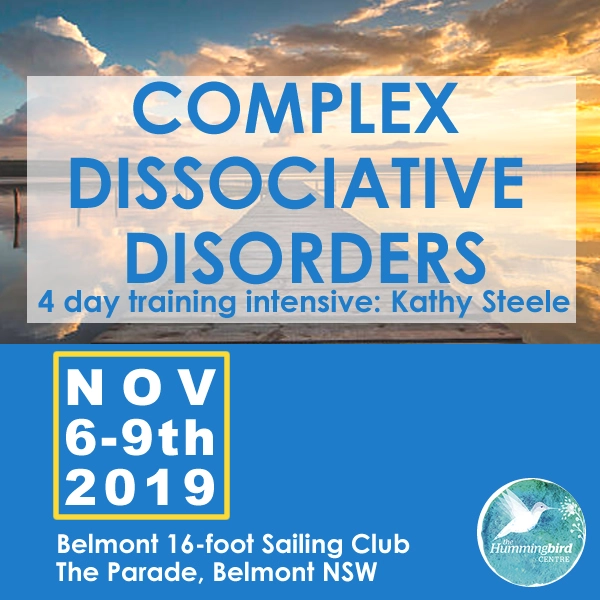November 6, 2020 @ 8:00 am – 5:00 pm
nternational expert Kathy Steele is making a rare trip to Australia to provide four days of intensive training covering practical, integrative approaches treating Complex Dissociative Disorders. This is a unique opportunity for those working in the trauma field to obtain expert training in dissociation by this world-renowned author and speaker.
Day 1
Participants will learn the four ways dissociation is defined in the literature, how to distinguish these, and why treatment differs for each definition. We will explore both the biological and psychological foundations for dissociation, with practical treatment implications. These include the role of innate motivational systems as organizers of dissociative parts, and the client’s inability realize what is overwhelming to know. The central role of the Polyvagal Theory in dissociation will be described as it relates to treatment. Participants will learn how to understand dissociative parts in a rational and compassionate way that dispels the myths and mystery that surround these diagnoses, and engage in highly integrative therapeutic work.
Day 2
We will focus on assessment strategies for complex dissociative disorders. We will explore the specific symptom clusters of Dissociative Identity Disorder and its lesser form, Other Specified Dissociative Disorder (OSDD). Participants will learn to distinguish between normal ego states and more complex dissociative parts, with treatment differences. We will also explore the subtle distinctions between dissociative amnesia and other forms of not remembering.
Day 3
Participants will learn standard of care, practical approaches within a phase-oriented treatment of complex dissociative disorders. Phase-oriented treatment will be briefly described, including essential principles and goals, and sequencing and pacing of treatment. A particular relational approach that emphasizes collaboration instead of attachment will be described, with rationale and treatment implications. We will spend ample time exploring how to help dissociative patients stabilize, how to modify usual approaches to stabilization for dissociative clients, and especially how to work with the inner system of parts to facilitate stabilization.
Day 4
We will explore ways to sequence and organize therapeutic work with dissociative parts in order to promote consistent integration. Common challenges, such as how to work with the client as a whole system, how to effectively work with child parts without fostering dependence, how to work with hostile and aggressive parts while maintaining compassion and limits, how to work with parts stuck in trauma, and how to improve inner communication and cooperation among dissociative parts will be addressed. We will identify common resistances and impasses, and learn how to resolve them. Ample case material will be included throughout.
Educational Objectives
Participants will be able to:
Day 1
- Describe the reasons why dissociation develops and why it does not resolve on its own.
- Define the four ways dissociation is described, along with treatment differences.
- List motivational systems and describe how they serve as a foundation for dissociative parts.
- Give at least three clinical implications of the Polyvagal Theory in the treatment of dissociative disorders.
- Describe what maintains difficulties in realizing.
Day 2
- Identify symptom clusters common in complex dissociative disorders.
- Describe Schneiderian symptoms of psychosis common in clients with complex dissociative disorders.
- Name the characteristics of dissociative voices that distinguish them from psychotic voices.
- Distinguish ego states, borderline modes, and dissociative parts in clinical practice.
- Differentiate dissociative amnesia from other forms of not remembering.
Day 3
- Describe the three phases of treatment of complex dissociative disorders and their respective goals.
- List the principles of treatment for complex dissociative disorders.
- Employ a sequenced approach to working with dissociative clients that fosters integration over time.
- Employ a collaborative relational approach that activates curiosity and exploration, and minimizes activation of attachment, and give rationale as to why this approach is important for clients with complex developmental trauma.
Day 4
- Describe ways to work with child parts that promotes integration and the competency of the adult self of the client.
- Discuss effective approaches to working with hostile and aggressive parts of the client that maintains a working relationship and decreases acting out.
- List common resistances and impasses in the treatment of complex dissociative disorders, and how to resolve them.
- Identify common mistakes in working with complex dissociative disorders, and how to repair them.
- Delineate ways to view and work with the client as a whole person, while working with various dissociative parts.








